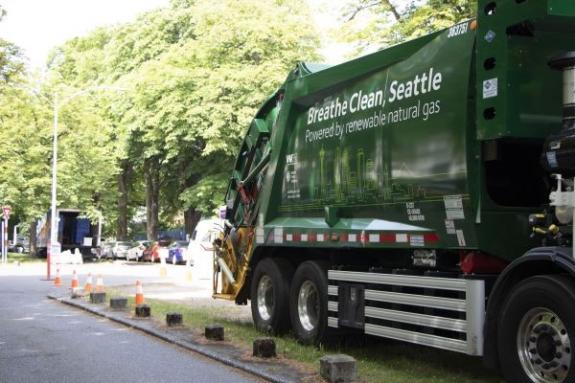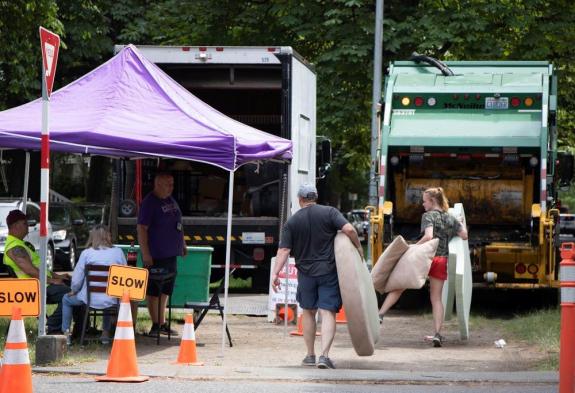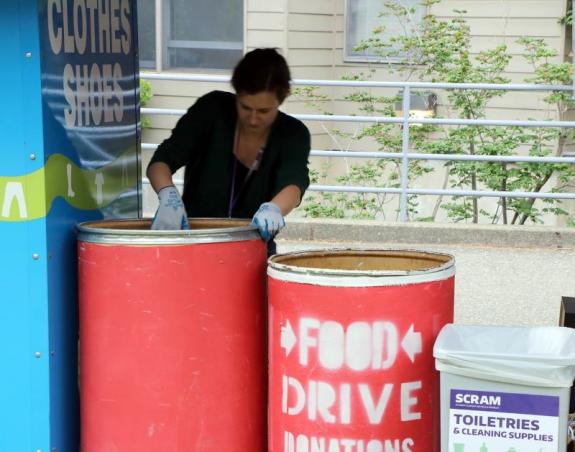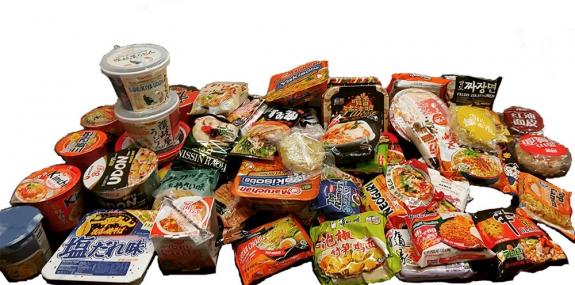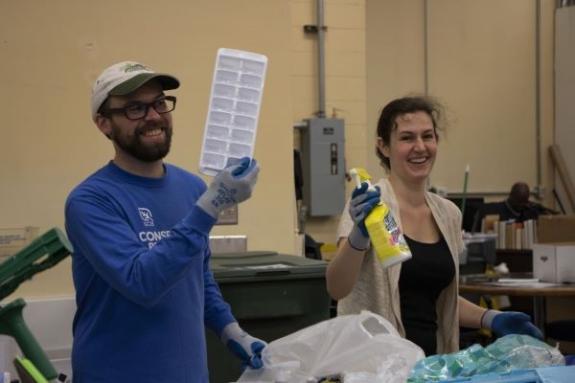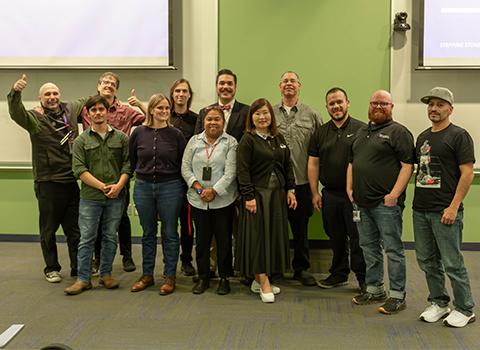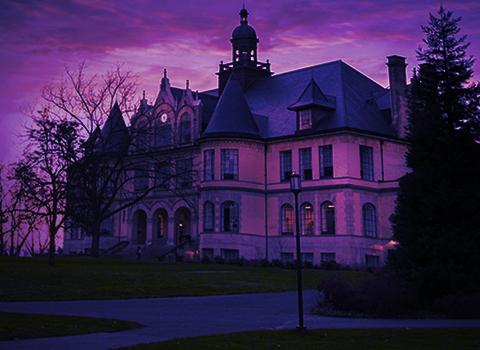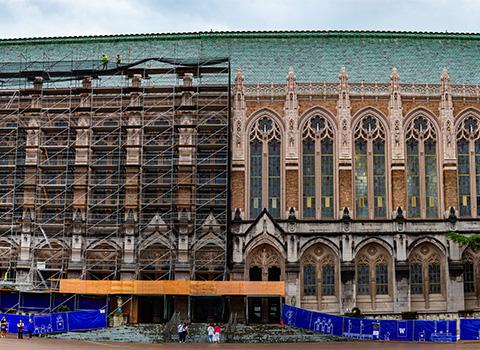Moving out but staying green
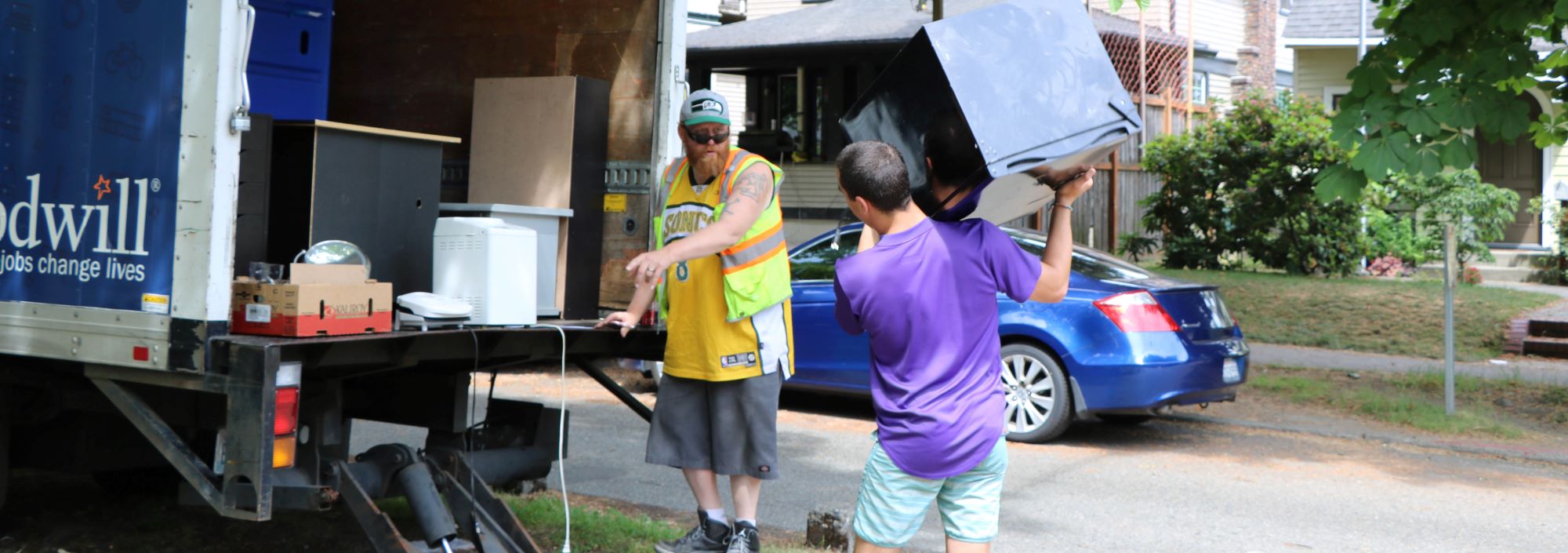
Husky Neighborhood Cleanup volunteer loads a Goodwill truck.
The UW has once again shown its commitment to sustainability through two annual events hosted in June by UW Recycling: SCRAM (Student Cleanup, Recycle and Moveout) and Husky Neighborhood Cleanup (HNC). Both events support the local community by diverting waste and supporting local nonprofits: the former collects on-campus residence hall and apartment donations, while HNC caters to students living on Greek Row.
Keeping campus clean and giving back to others
Keeping campus clean and giving back to others
SCRAM and HNC keep the campus clean by preventing overflowing garbage and illegal dumping, and help buoy organizations during summer months when donations typically run low. Partner organizations include Northwest Center, Goodwill, Waste Management, University District Food Bank, UW Food Pantry and Downtown Emergency Service Center (DESC).
HNC’s donation site, located at 17th Ave and NE 47th Street was convenient for students living in north campus locales. Goodwill and contracted vendor Waste Management parked on the median of Greek Row, allowing quick access for students to unload materials under the supervision of UW Recycling and its vendors.
A total of 6.64 tons of material was collected during Husky Neighborhood Cleanup, including over two tons of donations of clothing and furniture items to Goodwill — double the amount donated during last year’s event.
“This year, we tried something a little new with our Husky Neighborhood Cleanup event,” said UW Recycling program coordinator Adam Fehn. “We chose to hold it on the Wednesday and Thursday of student move out week and the Monday after, rather than on the Friday. Changing the day was an idea that we had proposed to minimize the safety risk caused by the graduation day traffic on Friday.”
43 tons of donations collected
43 tons of donations collected
SCRAM 2019 secured a total of 43.39 tons of donations — an increase from 34.52 tons in 2018. In partnership with UW Housing & Food Services (HFS), SCRAM set up 16 donation stations to take in unwanted items as students were moving out between June 10 -17. Bedding, clothing, emergency red backpacks, non-perishable food, small appliances, school supplies toiletries, and other household items were collected and sorted throughout the week before being redirected to local organizations.
“The total weight of SCRAM donations collected this year is the highest volume on record,” said UW Recycling program coordinator Holly Griffith.
Here’s the breakdown of 2019 donations:
- Clothing: 15.4 tons (up from 12.48 tons in 2018)
- Household items: 14.1 tons (up from 8.17 tons in 2018)
- Electronics: 6.2 tons (up from 3.8 tons in 2018)
- Toiletries: 4.60 tons (up slightly from 4.54 tons in 2018)
- Food: 3.19 tons (down from 5.51 tons in 2018)
Since 2003, Northwest Center has partnered with UW Recycling in helping students with move-outs on the Seattle campus. This year, the nonprofit, known as The Big Blue Truck, collected its largest volume of donations which increased by 20 percent over 2018 figures.
Filling the pantry shelves with food...and fun
Filling the pantry shelves with food...and fun
“It’s great to see students show up in ways that are not always obvious but have a real and positive impact on the community,” says Hannah Duffany, with University District Food Bank. “Canned good donations, such as soups, cereals, granola bars and bottled water help to keep our dry food shelves stocked for weeks after SCRAM and fill in some gaps when other sources of non-perishable items are scarce in the summer months.”
“One major highlight for us is the Pop-Up Noodle Museum which is created each year after SCRAM. On average we collect more than 60 different varieties of ramen instant noodles from around the world and display them for a week or so before they are distributed. Volunteers love sorting through the donation barrels where they find a plethora of unique, worldly items in addition to staple canned goods,” Duffany adds.
Griffith points out that waste is normally a ‘quiet’ thing — that is, aside from seeing the team’s education and outreach efforts, people don’t really see their waste “in action” that much.
Griffith says, “Often, we put something in the bin and then it magically disappears. A lot of our waste infrastructure is in the background. But SCRAM is big, and active, and really visible. It makes folks really think about where their stuff goes, even if it’s just for a couple of minutes. It’s an excellent way for students to both give back and take a look at what they may have wasted over the course of a single year and think about how they may be able to reduce it in the future.”
Where student donations go
Where student donations go
DESC, one of this year’s partners, serves 3,500 people every day, including chronically and formerly homeless populations. Don Rupp, DESC’s Volunteer and InKind Gifts Manager says the soaps and shampoos will be especially useful in its shelters while laundry and household products will be distributed to the agency’s 1,400 residents.
“The 1,300 emergency red backpacks will be given as holiday gifts for some of clients who are not housed,” Rupp says. “Each year we set out to give each person a gift, which has become more difficult as our organization has grown and the homeless population has increased. Knowing that all DESC clients who are living outdoors or in our shelters will receive something nice, but also life sustaining, is a relief for us, but also a meaningful gift for them. Look for lots of red backpacks out on the streets at the end of 2019!”
UW Recycling program coordinator Adam Fehn especially enjoys helping sort donations.
“We always find a variety of weird and fun items at our SCRAM donation stations and this year was no exception! I think the most surprising thing we found this year was the sheer number of crutches at our donation sites. We always get some, but this year we got a lot!”
